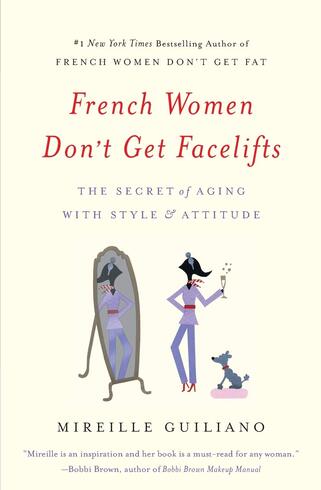
Before we discuss Mireille Guiliano’s 2013 French Women Don’t Get Facelifts, we have to agree that this, like many books of its kind, is not meant to be a blanket statement about beauty, or create a regional hierarchy, or even a condemnation about plastic surgery. This is fun book full of potential tips and tricks, and important reminders that getting older is beautiful in and of itself.
A follow-up to 2004’s French Women Don’t Get Fat and 2006’s French Women for All Seasons (and there have been many more since), this book continues the franchise of tidy tidbits of advice on how to age gracefully. Though “facelifts” is in the title, it’s the subhead that represents the book’s overall sentiment: The Secret of Aging with Style and Attitude. While all regions have their own special something, French women have always possessed “that thing” we’ve wanted to bottle for centuries.
What is, perhaps, distinctly French (aside from Guiliano’s ever-charming very-frank phrasing), is the overall acceptance of aging throughout the centuries in France, a place known for its beauty and style. It was Carrie Fisher who famously said, "Men don't age better than women, they're just allowed to age.” A member of an industry that demands women stay young and beautiful in order to work, most of you reading this right now are possibly members of a community that demands you are young and beautiful, also. (Are you one of the oldest members on your management team, for instance?) The pressures to retain and long and forgotten youth are everywhere, even if we’re not aware of them.
As we’ve already established, it’s a mistake to approach this book too literally, as it’s full of “do this not that (oh, wait--and also do this)” lists, combined with personal tales from Guiliano’s life experience. This is one woman’s opinion. (If you’re lucky enough to get this on audio, it’s offered as one woman’s opinion read in her own French accent, which is truly wonderful.) The combination of it all creates a tutorial for how to make your life—your skin, your hair, your clothes, your self-care—living art. And this process will change and grow as you do—and it’s all okay.
Growing up American in a family of runners, I can confirm this was not how we approached the day: get up early, workout, measure your food, accomplish this, conquer that. When I read Guiliano’s books—and I have read all of the aforementioned—I realize exactly how American I really am. Now officially in midlife, when I look in the mirror, I also realize how American I really am. I have lines on my face and my skin has changed. My body has changed, too. Why do I feel so obsessed with this all the time?
If this book was written by a so-called fitness guru it would be loaded with lists and decrees. Guiliano’s books don’t do that. Yes, you get the impression she favors the French way—without that, she wouldn’t have a book. After reading this, we’d all prefer the French way, because there’s nothing in this book you couldn’t start today. It’s lifestyle-based, but not in the “lifestyle influencer” way. What is your prescription for laughing and loving? What are the rituals that make you feel great about yourself? Does your attitude match your style? Do you give exercise the same importance as relaxation? What do you see when you look in the mirror? And, importantly, what exactly is the quality of the life in your years? In the end, it has absolutely nothing to do with facelifts. It’s about loving your life and owning your age every single day.

The Crush Letter
The Crush Letter is a weekly newsletter from Dish Stanley curating articles & intelligence on everything love & connection - friendship, romance, self-love, sex. If you’d like to take a look at some of our best stories go to Read Us. Want the Dish?

